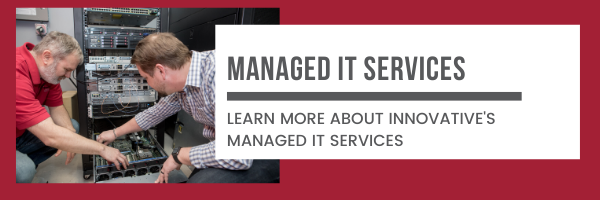Windows 11: Should You Upgrade Now?
It's here. This week, Microsoft is launching the latest version of Windows, Windows 11. This is certainly no secret, especially if you've been watching Sunday night football and the flood of Microsoft ads during the game.
With the October 5 launch of Windows 11 occurring in less than 24 hours from the date of this article, Microsoft wants you to upgrade sooner rather than later. But there are always unknowns and fears – some valid and some perceived – around any change in your business.
Many users love being on the cutting edge of technology and eagerly await upgrading their PCs to the next generation of Windows. If you've found this article, your employees – possibly including yourself – are likely not so excited about the impending change. This skepticism of change means it's even more important to ensure the smoothest possible upgrade experience. Otherwise, your users (and you) will get more and more resistant to future technology changes – and there's no way around the never-ending needed to change and upgrade your technology.
So, you'll want to manage this with some attention, planning, and preparation. As with any upgrade, you never know what implications it can cause with integrations, other software applications, and other devices on your network. Taking the time to test and plan is critical to a positive experience.
As a managed service provider responsible for managing thousands of devices in hundreds of different business environments, Innovative has been through more than our fair share of Windows upgrades in the past 20 years. This article will share considerations and best practices for determining when to upgrade your Windows operating system.
Should you upgrade to Windows 11?
Eventually, you will have to upgrade to Windows 11 to maintain compatibility with future hardware and software and ensure network and information security. However, compatibility and security concerns won't force you to make this switch until Windows 10 reaches end of life on October 14, 2025.
But, you'll likely want to upgrade sooner.
Beginning tomorrow, October 5, new Windows PCs will either come standard with Windows 11 or prompt an upgrade from Windows 10 to 11 at initial startup. Devices that come standard with Windows 11 can often be rolled back to Windows 10, but this will become less and less effective over time as Windows 11 reaches wider adoption and we come closer to Windows 10 end of life.
You'll likely find it convenient and cost-effective to align your planned Windows 11 upgrade alongside your planned PC upgrades over the next few years.
Aside from hardware upgrades creating a good time to upgrade, you may want to consider upgrading eligible existing computers simply because of the cool new features offered in Windows 11. These features and brand-new design make navigation of your computer much more user-friendly.
Your IT company or IT department can help you evaluate the best time to upgrade based on the value of new features to your organization and any other timed hardware upgrades. Innovative clients will work with strategy consultants over the next few weeks and months to identify the best way to incorporate Windows 11 in your existing lifecycle management plan.
How will you know if your device is eligible for the upgrade?
Microsoft will only push Windows 11 upgrade offers to PCs that meet minimum requirements. Microsoft is encouraging users to run their PC Health Check app to determine whether or not they are compatible with the Windows 11 upgrade.
It's important to note that the Microsoft PC health checker only checks hardware to determine if your PC can simply run Windows 11. It does not check whether all your applications, software, and drivers—more so non-Microsoft products—are compatible with the new Windows upgrade.
This means that even if the PC health check app says that your system can support Windows 11, there's no guarantee that all your applications and external devices will continue to work. For example, your printers may not print, your accounting software may refuse to run, or integrations with legacy applications may stop working correctly after the Windows 11 upgrade.
Microsoft will send a popup or upgrade notification to eligible devices sometime between October 5 and mid-2022. Receiving this notification simply means Microsoft has identified your PC as compatible with Windows 11 specifications. It does not mean that installing the update won't break anything necessary to do your job.
Innovative has advised our clients to instruct their end-users to refrain from accepting this upgrade notification or offer.
When you're ready to upgrade, work with your IT company (Innovative clients – that's us!) or IT department to test the impacts of the upgrade. They must make necessary changes to other systems and roll out the upgrade in a strategic and planned way that minimizes negative effects on your business.
Windows 11 is an Essential Element in Your Lifecycle Management Plan
The Windows 11 era is here. However, some businesses will be ready to upgrade before others. Blindly upgrading to Windows 11 without testing its compatibility with other applications, systems, and devices can have serious repercussions.
Innovative recommends including Windows 11 upgrades in your regular lifecycle management planning processes to avoid any unexpected downtime.
Innovative would be pleased to help you through this or any other element of your technology strategy.



